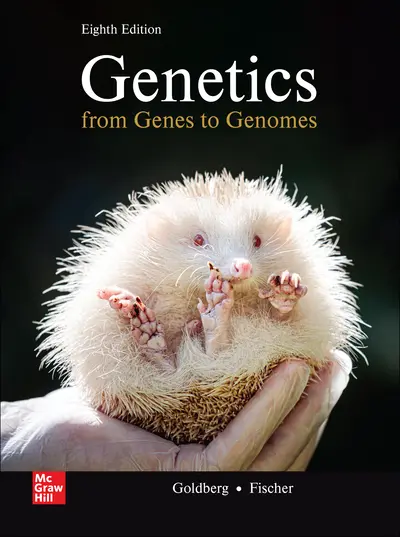My Account Details

ISBN10: 1265352267 | ISBN13: 9781265352264

Genetics: From Genes to Genomes
Product not yet available for student view. Change to an older release to view student options.
- Lowest Price!
McGraw Hill eBook
Textbook Rental (150 Days Access)
- Rent for a fraction of the printed textbook price
- Complete text bound in hardcover or softcover
Loose-Leaf Purchase
Unbound loose-leaf version of full text
Shipping Options
- Standard
- Next-day air
- 2nd-day air
Orders within the United States are shipped via FedEx or UPS Ground. For shipments to locations outside of the U.S., only standard shipping is available. All shipping options assume the product is available and that processing an order takes 24 to 48 hours prior to shipping.
Note: Connect can only be used if assigned by your instructor.
Connect (180 Days Access)
- Digital access to a comprehensive online learning platform
- Includes homework, study tools, eBook, and adaptive assignments
- Download the free ReadAnywhere app to access the eBook offline
Connect + Loose-Leaf
- Comprehensive online learning platform + unbound loose-leaf print text package
- Connect includes homework, study tools, eBook, and adaptive assignments
- Download the free ReadAnywhere app to access the eBook offline
Shipping Options
- Standard
- Next-day air
- 2nd-day air
Orders within the United States are shipped via FedEx or UPS Ground. For shipments to locations outside of the U.S., only standard shipping is available. All shipping options assume the product is available and that processing an order takes 24 to 48 hours prior to shipping.
McGraw Hill eBook
Details:
- Normally the lowest price option for student
- Integrates in your LMS
- Accessible tools for students, including read-aloud functionality, jump links and dynamic note-taking and highlighting features
Textbook Rental (150 Days Access)
Details:
- Rentable option
- Hardcopy and softcover formats
Loose-Leaf Purchase
Details:
- Unbound loose-leaf version of full text
Connect (180 Days Access)
Details:
- Integrates in your LMS
- Prebuilt courses, presentation slides and instructor resources
- Test question banks, adaptive assignments, essay prompts, video content and more interactive exercises specific to your course subject
- eBook access (with included ReadAnywhere app)
- Print book add-on availability
- Remote proctoring
Connect + Loose-Leaf
Details:
- Comprehensive online learning platform + unbound loose-leaf print text package
- Connect includes homework, study tools, eBook, and adaptive assignments
- Download the free ReadAnywhere app to access the eBook offline
* The estimated amount of time this product will be on the market is based on a number of factors, including faculty input to instructional design and the prior revision cycle and updates to academic research-which typically results in a revision cycle ranging from every two to four years for this product. Pricing subject to change at any time.
Genetics: From Genes to Genomes represents a new approach to an undergraduate course in genetics. It reflects the way the authors currently view the molecular basis of life. The textbook emphasizes both the core concepts of genetics and the cutting-edge discoveries, modern tools, and analytical methods that will keep the science of genetics moving forward.
1 Mendel’s Principles of Heredity
2 Extensions to Mendel’s Laws
3 Chromosomes and Inheritance
4 Sex Chromosomes
5 Linkage, Recombination, and Gene Mapping
PART II What Genes Are and What They Do
6 DNA Structure, Replication, and Recombination
7 Mutation
8 Using Mutations to Study Genes
9 Gene Expression: The Flow of Information from DNA to RNA to Protein
PART III Analysis of Genetic Information
10 Digital Analysis of DNA
11 Genome Annotation
12 Analyzing Genomic Variation
PART IV How Genes Travel on Chromosomes
13 The Eukaryotic Chromosome
14 Chromosomal Rearrangements
15 Ploidy
16 Bacterial Genetics
17 Organellar Inheritance
PART V How Genes Are Regulated
18 Gene Regulation in Prokaryotes
19 Gene Regulation in Eukaryotes
20 Epigenetics
PART VI Using Genetics
21 Manipulating the Genomes of Eukaryotes
22 Genetic Analysis of Development
23 The Genetics of Cancer
PART VII Beyond the Individual Gene and Genome
24 Variation and Selection in Populations
25 Genetic Analysis of Complex Traits
About the Author
Michael Goldberg
Janice Fischer
Dr. Janice Fischer is a Professor at The University of Texas at Austin, where she isan award-winning teacher of genetics and Director of the Biology Instructional Office.She received her Ph.D. in biochemistry and molecular biology from HarvardUniversity, and did postdoctoral research at The University of California at Berkeleyand The Whitehead Institute at MIT. In her current research, Dr. Fischer usesDrosophila to examine the roles of ubiquitin and endocytosis in cell signaling duringdevelopment.
Accessibility
Creating accessible products is a priority for McGraw Hill. We make accessibility and adhering to WCAG AA guidelines a part of our day-to-day development efforts and product roadmaps.
For more information, visit our accessibility page, or contact us at accessibility@mheducation.com
Need support? We're here to help - Get real-world support and resources every step of the way.